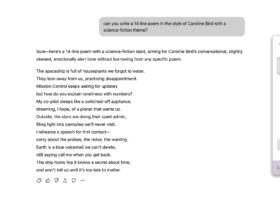How to tackle the “What does it mean?” question

“Poems need room for the imagination to engage” says Roselle Angwin in a interesting blog post on creating ambiguity in a poem, not telling the whole story.
So here’s a problem I have, and I can’t be the only one! When I take a poem to a workshopping group I really don’t like explaining. Anything. I just don’t think it’s relevant. So if I’m asked straight away “what does this mean?’ I want to say ‘what do you think it means?’ Letting people decide, or hearing people discuss amongst themselves can be very revealing about where the problems are. Not in the sense of ‘oh no, they’ve got it all wrong, I need to change that so that my meaning is clear.’ Because if I do that, there’s no ‘work’ left for the reader. And anyway, I love it when people put their own take on a piece. It means they’ve engaged with it.
But how to tackle the ‘what does it mean” question? Sometimes people get a bit tetchy if I refuse to provide answers. And if I say ‘I prefer not to explain’ it all sounds rather pompous. Or if I do find myself explaining, I get all defensive and then annoyed that I’m coming across as not wanting criticism, which of course I do, but I think this ‘need to find the meaning’ gets in the way of really looking closely at the thing.
There are plenty of poems I can’t make sense of, especially on a first reading. If there’s a specific word or phrase I don’t understand, I may comment that this tripped me up, or ask if it’s important that the reader understands it.. By asking “is this important?” you are prompting the poet to question it in her mind. Personally, that’s the kind of feedback I find helpful – comments that make me really interrogate what I’ve written. What do you think? Do you agree? I know it’s not easy to give feedback – I find it really hard myself – so am I being unreasonable? Should I be grateful for any kind of feedback?



